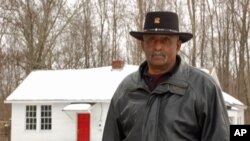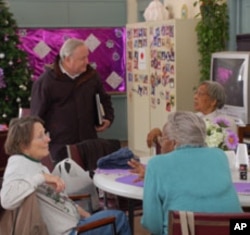For many decades, schools in the American south were segregated based on race. Although the U.S. Supreme Court ruled in 1954 that segregation was unconstitutional, many states fought the decision, and it took years before their schools were fully integrated. In rural areas of the South, buildings that once served as schools for African Americans have been abandoned for decades. Now, some former students are at the forefront of efforts to preserve them.
Buckingham Training School in Dillwyn, Virginia, is being restored to serve a new generation, thanks in large part to Wilbert Dean. "I was moved to do something," he says. "It had turned into a trash dump. They were collecting trash at this site where I went to school."
Dean went to school here for three years, beginning in 1953, when he was 11 years old and in the 5th grade. "Without this school, I would not be standing here today, because the school gave me an opportunity to finish high school." Dean would go on to get a master's degree in business administration.
Harvey Shelton, who attended Buckingham Training School from 1947 to 1953, credits it with setting him on the path that led to a doctorate degree from Virginia Tech. "I probably would have gone to high school and maybe even college if this school hadn't been here." But Shelton says it would have been more difficult. "What this school provided me was inspiration, people that told me I could do whatever I wanted to do."
One of thousands
Built in 1923, Buckingham Training School provided generations of African Americans with that inspiration. It was one of more than 5,000 Rosenwald schools built with funding from Julius Rosenwald. The co-owner of Sears and Roebuck, one of America's largest retailers, financed the effort at the urging of Booker T. Washington, a former slave who became a prominent educator.
But Rosenwald only footed half the bill. "The local community had to come together and provide the other half of the money to build these schools," says David Brown, executive vice president of the National Trust for Historic Preservation, which is guiding efforts to save the Rosenwald schools.
"They were begun around 1912, and that was a time when there was no education for blacks in the rural South, so this was a big step forward for the black community."
Built along plans that were comparable to schools being built for white children, the Rosenwald schools were considered state of the art for their time. But by the time schools in the South were integrated in the mid-20th century, they were out of date, and soon abandoned.
Serving the community again
Brown says the National Trust for Historic Preservation began hearing from alumni in late 1990s, seeking help to save their schools. Since then, seven schools have been given new life in their communities with help from Lowe's home improvement stores and volunteers.
"We really want to see these places reused," says Brown. "They were built as symbols of community pride and they were centers of community life and we want them to continue in that vein."
Wilbert Dean says Buckingham Training School will reopen as a community center at the heart of a four-acre county park, Ellis Acres. The park is named for Rev. Stephen J. Ellis, the man who led the campaign to establish the Buckingham Training School when black children were barred from attending the county secondary school.
"We can take this land that was designed to segregate the county and split it apart, we can use the same land and these same facilities to bring the county together," Dean says, "to make Buckingham a better place and improve the quality of life."
Scrabble School, in Castleton, Virginia, is already doing that. The history of the school and the struggle African Americans faced to get an education is prominently displayed along one wall. But when Scrabble reopened its doors in May 2009, it did so as the Rappahannock County Senior Center, at the suggestion of Dorothy Warner. "I went up to the old senior citizens' building one day, and they were in a room that was half this size, and we had a meeting that night, and I said, 'We can put our seniors in there.'"
Warner didn't go to school at Scrabble, but her husband, who was at the forefront of restoration efforts, did. E. Franklin Warner, who became a budget analyst in the White House, died in 2003, and Dorothy took up the cause. She says the school was a reminder to him of how far he and his classmates, some of whom became doctors and lawyers, had come. "He would probably say we made something of ourselves coming from a two-room school."
Many graduates of Rosenwald schools did, despite the fact that when they were students, African Americans were often treated as second-class citizens. Alumni want to ensure that the history of their schools is remembered for generations to come.
















